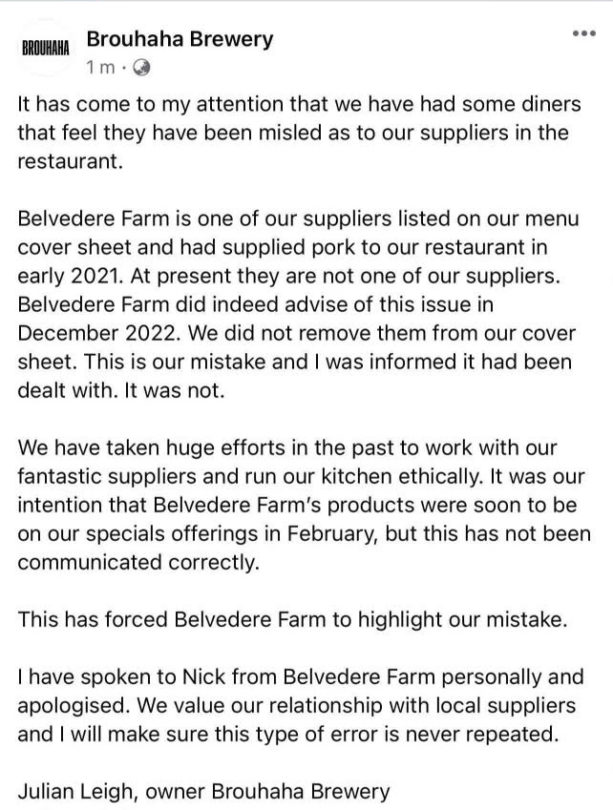
Social media backlash highlights crisis comms value

Diverse people holding emoticon
A minor issue between two local businesses has spiralled to become a major headache and a lesson in reputation management and crisis communications for a small brewery.
Last weekend, Sunshine Coast pork producer Belvedere Farms published a video to social media taking its local brewery, Brouhaha, to task for including its logo on its menus.
While the farm had been an infrequent supplier in the past, it had not supplied the brewery since April 2021.
The issue came to a head after the farm had made a number of requests to remove its logo from brewery marketing, which had gone unheeded.

Brouhaha’s now deleted apology
Last week, the farm was contacted by one of its customers noting her excitement at being able to support the farm while at the brewery. The customer was reportedly upset at feeling misled upon learning that the pork was not supplied by the farm.
In a passionate video about his farming approach and why he felt mislabelling his pork mattered, Belvedere’s Nick Holliday said he regretted having to post but he felt he had no option after a number of prior approaches.
“I sent a message to this restaurant this morning, saying, ‘hey, you’ve already been told, please take this down,’ he said.
“And there’s been no response to that. I am going to name them in this post, because frankly, they are using our name and we don’t get to hide as they use our name.”
The farm is a vocal advocate for ethical farm practices and community supported agriculture.
“I’m sorry to have to put a restaurant in my local community on blast like this. But this won’t do and they ought to know better,” Holliday said.
“We are trying to have a local food movement here that respects people and animals, and community. And that will not occur while things like this are allowed to occur.”
The post quickly went viral amassing more than 10,000 views in just a few hours.
The use of local produce and being part of a circular economy has featured heavily in Brouhaha’s marketing, with its menu identifying a number of other local suppliers in addition to Belvedere.
The brewery’s response
On Saturday afternoon, more than 24 hours after the issue went viral, the brewery posted an apology and, in return, Belvedere Farms removed its initial post and shared the apology with its followers.
However, while many customers of the brewery posted positive comments on the apology, the apology also generated significant criticism including from those who felt they had been misled. On Sunday morning, the brewery posted a second, longer, explanation.
After the pork producer raised issues with the second apology both were removed from social media. The brewery’s social media currently has no mention of the controversy despite the issue becoming well-known in the small hinterland community.
The aftermath
While all parties have sought to move on, both have very different perspectives on the importance of the issue and how it was handled.
Belvedere Farms Nick Holliday feels it was an important issue to raise.
“The thing I want to underscore is that your provenance of food really matters, whether you’re Coles or some restaurant in town,” he said.
“It matters, particularly when you base your brand values around your connection with the local community. And that’s why this was such a big issue.
“This came to our attention because someone who was literally fooled by that was horrified.”
Holliday said the way it was dealt with also left a lot to be desired.
“The second thing that really matters is what you do when you’re faced with an issue. And clearly, this is just a massive example of how not to deal with that,” he said.
“And, you know, an issue that could have really easily been resolved on Friday of last week is still being talked about today. And I think that’s a real shame, basically.”
Brouhaha owner Julian Leigh told Brews News that the brewery was at fault for not having responded to the request, but was unhappy with how the issue was handled.
He said that between the challenges of a busy time of year and COVID-related staffing issues, the brewery hadn’t acted on the farm’s initial requests.
“Something was missed that should have been actioned, and it wasn’t,” he told Brews News.
“Hand on heart it was our fault, and the supplier was sort of forced into acting. Not in the way that he did. But that’s another story.
“But we have to own it, we were given a fair amount notice to change a small detail, and we just didn’t do it.”
However, he said that the reaction was overblown for the actual issue.
“It’s pretty straightforward for keyboard warriors to be able to have a go,” he said.
“Interestingly a lot of the negative reaction we got was people who didn’t actually read the apology correctly, or actually listen to the initial story properly, and went off askew.
“What can you do? It’s one of those things that you can try fighting every comment or just try and minimise that.
“Choosing the wording of a post is going to be taken many different ways. It was my wording was my apology and was sincere,” Leigh said.
“If that was misread by some people, I don’t have a PR guy living in my pocket and I’m only human but thought I was doing the right thing.”
“On the whole it was well accepted and then that’s why then a second post came about, to offer a bit more explanation and then that upset some other people in different ways.
“And it just ended up being a no-win situation.”
Crisis communication plans a must
Issues escalating and taking on a life of their own is nothing new in the social media age, including in the brewing industry. Breweries have been praised for their response or described as experiencing corporate panic.
In many cases, the online fury comes out of the blue, blindsiding breweries unprepared for a backlash.
Communications expert Kristin Devitt from KDPR says that with the costs so high, all businesses should have a plan in place for a crisis.
“These days, news travels fast,” she said. “Most people have easy access to social media platforms to post their concerns and criticism, and when they have something to say, they don’t hesitate, so as a business owner, having a plan as to how you will respond to a likely range of scenarios is essential.”
“Timing is everything. Your social media strategy should include guidelines on how to respond to complaints.
“[Over] 25 years, guiding many through crises, I’ve witnessed firsthand the value of having a plan and protocols in place when things go wrong.”
She says that good communication is not out of reach even for small businesses with planning.
“Putting together a crisis management plan is not as overwhelming as it may seem,” she said.
“Some simple steps include doing a risk assessment of your business – what is the range of risk scenarios?
“What are everyone’s roles and responsibilities? Are there responses to particular scenarios that can be agreed upon in advance?
Devitt said that if your business has made a mistake, the best strategy is own it.
“Say sorry and add a brief statement on what you are doing about it now, along with what you will do to prevent it from happening again.”
She said that while these decisions can be hard and in the spur of the moment, it’s generally not a good idea to remove posts.
“Unless material is offensive or defamatory, it is generally not a good idea to delete posts or negative comments,” she said.
“Ideally, you will respond to every negative comment, as you should positive ones. If someone continues to comment, invite them to speak with you directly or via direct message rather than the public forum.
“Most people who post negative comments just want to be heard.
“Even a challenging situation is an opportunity to showcase the values of your business, your willingness to listen to your critics and learn from mistakes.”
Where possible, businesses should engage independent advice which can usually be a cool head in a crisis.
“It hurts when someone posts something negative about you or your business, so it is not surprising people take it personally, and can come across as defensive in response,” she said.
“Having an experienced advisor to provide honest, clear, unemotional advice on the best way to respond is a big help.
“It can make all the difference in diffusing an emerging issue or crisis before it gets out of control.”



